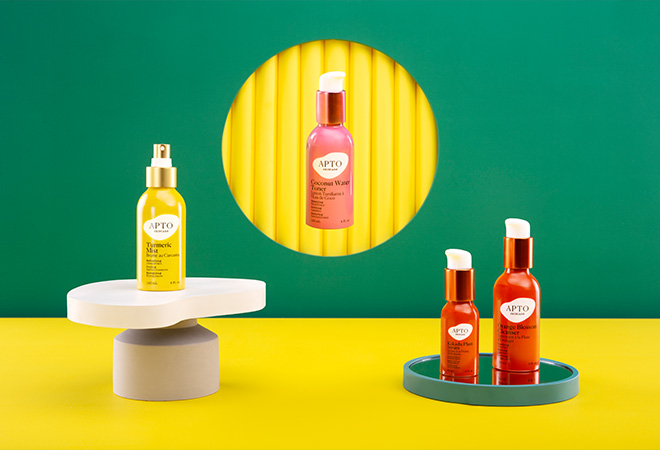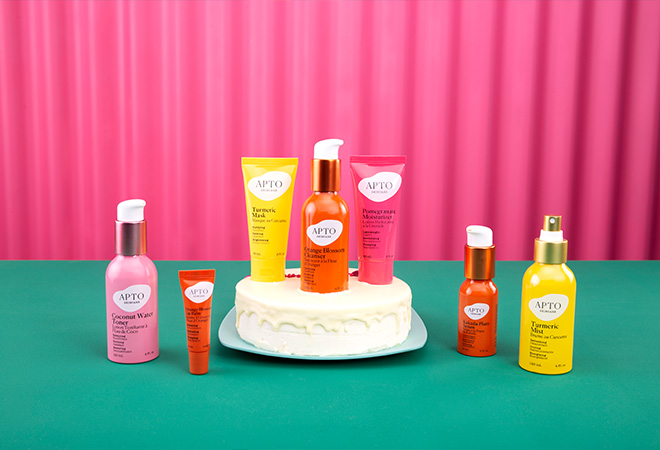Retailer-led accelerator programs present an important cornerstone of industry innovation, supporting the next generation of fresh entrepreneurial talent through mentorship, financial grants, and shelf presence.
Plastic-neutral and cruelty-free suncare range Everyday Humans and minimalist, family-run, and locally manufactured skincare range APTO were selected for the Target Takeoff Accelerator program in 2019 and 2021 respectively. Everyday Humans originally began under the name "Everyday For Every Body" in 2018, but relaunched with its current name in June 2020. The initiative, available not just for beauty brands but across all CPG categories, entails a 5-week virtual program, with 10-15 hours of weekly work. It is free for participating founders, with a $5,000 stipend award to each company.
BeautyMatter caught up with founders Charlotte Chen Pienaar and Marta Cros to discuss their key takeaways, the effects of launching at Target on their business, and the future ambitions ahead.
What has your partnership with Target been like?
Charlotte Chen Pienaar, Founder, Everyday Humans: Target Takeoff’s Accelerator program has been a core part of our journey from the beginning. Our partnership started on Target.com in early 2021 and, 10 months later, launched in line with 717 stores nationwide. Target has always believed and invested in women-owned, minority-owned, and sustainable brands, and it’s been an honor to be one of a handful of indie brands that Target champions, helping us realize our mission of pro-planet sunscreen for all humans, by giving us an opportunity to show our brand to a mass audience.
Marta Cros, Founder, APTO: The experience of participating in the Target Takeoff Accelerator program was priceless. During the duration of the program we had access not only to Target’s buying team, but also to several different leaders in the organization that advised and mentored us through the process of understanding what it means to do business with a mass retailer. Having a great product is just one requirement. You need to be ready financially and logistically in order to be successful.
What numerical impact has the accelerator made on your business?
CCP: Target enabled us to grow +300% since the debut of the brand, and we can correlate the success with Target Takeoff’s Accelerator program. Participating in the program helped us refine our product positioning and assortment strategy, and helped us clarify our mission so that we could successfully present an attractive business case back to Target.
MC: Being sold at Target is a major milestone for any brand. We’ve reached nearly 800 brick-and-mortar stores plus Target.com, so the reach is massive.
How has the consumer and industry feedback been on launching into Target?
CCP: Our existing customers and fans have been very excited and enthusiastic about spotting us in their favorite Target store and can now replenish their sunscreens in real life. It’s particularly rewarding to see people outside of our community snapping videos of their Target runs and telling us how they’re discovering us for the first time. Industry feedback has been very positive as we witness more and more retailers changing their buying thesis—placing an emphasis on curating more inclusive, sustainable, and smaller players to adapt to modern shoppers’ needs. The amount of inbound interests we have—from the US, Europe, Middle East, Southeast Asia, and China—have been incredible. We are optimistic about our future but want to stay focused and careful as we navigate our growth opportunities.
MC: Everybody loves Target, and our customers are not different.
How do you find consumer engagement differs on your own brand sites versus at a retailer like Target?
CCP: Selling in a brick-and-mortar store is vastly different from selling online as there is no social media content, influencer reviews, or visuals that can support the storytelling of your brand. We know that communication on-pack is crucial to our brand’s success, and we made sure that we have succinct copy, eye-catching packaging, and the necessary information to help the customer make their decision to choose us in-store.
MC: APTO does not have a strong focus on D2C, so our e-commerce site is a place where we see existing customers replenishing products they’ve tried and loved. They’ve previously purchased them or have sampled them through some subscription boxes like IPSY. We see Target as a major discovery platform for APTO. Being on their shelves offer us the opportunity to be exposed to thousands of shoppers that are looking for brands aligned with their values: clean ingredients, affordable price points, sustainable practices. Having Target’s seal of approval is a major advantage and accelerates credibility and conversion.


Charlotte, what inspired the launch of the new skincare product, a cleanser incorporating upcycled ingredients?
CCP: Sustainability has always been a core pillar of our brand’s DNA. The launch of our first non-SPF product in our assortment gave us an opportunity to showcase how we can push our eco agenda forward beyond eco-friendly packaging. Utilizing upcycled ingredients is a positioning we take to minimize waste beyond packaging and to contribute to the circular economy, by incorporating food and vegetable extracts from commodity crop waste that would usually be discarded. The Ease Up PHA Watery Oil Cleanser launch furthers our mission to increase sun protection awareness for all, and help consumers build healthier and more sustainable habits around sun-led skincare.
How was working with a beta tester program to influence the product development process?
CCP: We launched our first Beta Tester program when we were developing Ease Up, wherein we invited over 200 brand fans and customers to test our first non-SPF product prior to its debut. The program offered real-time feedback from the community that provided better insights into the formula’s performance, positioning, and messaging. More than that, it was exciting to invite our community into our product journey and to give our fans a sneak peek of the internal workings of a beauty brand. With the success of the program, community testing will continue to be part of our product development strategy moving forward.
Why is it important to incorporate active consumer feedback into this process?
CCP: As a conscious beauty brand that stands for uncompromised standards and principles, the power of the community means we can gather vital feedback to provide our customers with products they actually want and need. In the case of Ease Up, our community collectively agreed that creating an effective post-sun care skincare product was the next step.
What did it feel like being the first plastic-neutral SPF brand on such a mass retail level?
CCP: The selection at Target is increasingly competitive as more non-sunscreen brands are launching SPF within their skincare assortment, but we’re setting ourselves apart as THE next-generation sunscreen specialty brand of choice, by creating high-quality, inclusive, and eco-conscious sunscreens that specifically targets the Gen Z and millennial customer. Our focus on sustainability is a strong differentiating factor as more young consumers increasingly view sustainability as a Top 3 purchase priority, and we’re honored to be the first Plastic-Neutral certified SPF brand on Target shelves that serves this new consumer behavior.
Has the increasing scrutiny around sunscreen ingredients impacted your business?
CCP: The terminology of "clean" vs "not clean" has created a lot of misconceptions around physical and chemical sunscreens due to a lack of legal definitions, which can be hard for consumers to narrow choices in a crowded marketplace. At Everyday Humans, our promise is to create consciously made products, spanning both ingredient cleanliness and sustainability, and we anchor our product development with those two pillars in mind. We are aware that new regulations and ingredient innovations are an ever-changing landscape, and that’s why transparency is so important for consumers and key to helping move the industry forward.
Speaking of products, Marta, what was the process of editing your range from 35 products down to 7 like?
MC: It all started when I got stuck with my family in the Dominican Republic during the initial COV lockdowns, back in March 2020. I had packed a small suitcase with just the essentials for one week, and we ended up staying for 99 days. Initially, I panicked—no Amazon Prime, closed stores, etc. But after a few days, the feeling of not making decisions every morning about what to wear or which mask to use became extremely liberating. I realized that, as a working mom of two young kids, I was craving simplicity. And it was at that moment that I decided, for once, to create the line of products I wanted for myself. Effortless, effective, sustainable, and fun. I knew I just wanted one product for each category, so that was the first step towards paring down the assortment. We then used a mix of data from our own e-commerce platforms and our product reviews at partner sites such as IPSY to figure out the best-performing formulas that would work for most skin types.
On your website, you state that: "We’ve made a few mistakes that led to some interesting anecdotes.” What are these mistakes and anecdotes?
MC: As an entrepreneur, I’ve felt pressured by the “fake it till you make it” mentality since the moment I launched my first business, but it is not for me. I believe in owning my mistakes and learning from them. And in the last seven years there’s been plenty! For instance, we actually launched APTO under a different brand name, The Ritualist. We had a trademark for that name under “wellness services,” but not for products. Shortly after launching, we received a very formal letter from the lawyers of the brand Rituals. They were obviously right, and I pleaded with them to give me some time to fix it. Their CEO was extremely gracious and allowed us to continue selling the products under The Ritualist for six months. That gesture literally saved us from going bankrupt. I learned to be more detail oriented and also compassionate with others.
Another mortifying moment happened the day after I gave birth to my daughter. We had just rolled out a big sampling campaign with IPSY, and we started receiving comments from people saying the mask was turning their skin green. I still remember some of the comments: “I look like The Hulk!” I was horrified. We figured out the issue was coming from one of our raw material suppliers. We dealt with it, but we’ve been obsessed with testing and quality control at the factory ever since.
Is minimalism the beauty of the future? Why or why not?
MC: Minimalism is already a reality in the beauty industry—many other brands are taking a similar approach in other categories, such as Merit for makeup, Plus for body or Odele for hair. The motivation for taking a minimalist approach is varied—for some customers, it has to do with sustainability, and the realization that one of the best things we can do for the environment is to produce less, consume less, and be more thoughtful about our choices. For other people, minimalism has to do with the realization that simple is not basic, it’s transformative.
As the conversations with Everyday Humans and APTO proved, every entrepreneurial journey comes with its own unique challenges, pitfalls, and eye-opening moments. From rebranding to taking the product development road less taken, courage, conviction, and support through fellow industry mentors like the Target Accelerator program remain vital components of professional growth and evolution, no matter what your brand mission.